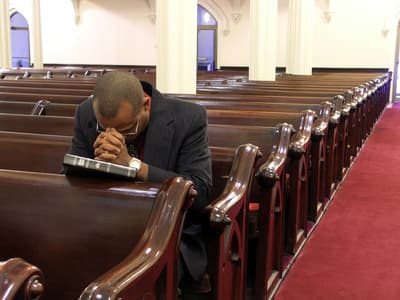Joseph – Enduring Hardship

The investiture of Joseph to become the vizier of Egypt was one of the highest moments in Joseph’s life. After Joseph interpreted Pharaoh’s dream, Pharaoh promoted Joseph, put him in charge of the affairs of government, and made him the person responsible for preparing the nation for the coming seven years of famine.
Pharaoh said to Joseph, “You will be in charge of my palace, and all my people will do what you say. I will be more important than you, only because I’m Pharaoh” (Genesis 41:39). The ceremony of installation narrated in Genesis reflects rituals depicted in Egyptian monuments. The investiture of Joseph included several rituals.
First, Pharaoh took off his signet ring and put it on Joseph’s finger. The signet ring was used by Pharaoh to sign important documents. Second, Pharaoh put a robe of fine linen on Joseph and put a gold chain around his neck. The robe was probably a type of garment worn by government officials. The golden chain identified him in his official capacity as an officer of Pharaoh. Third, Pharaoh gave Joseph a chariot to indicate that Joseph was the second-in-command in Egypt. Fourth, Pharaoh put Joseph in charge of everything in Egypt, “no one anywhere in Egypt will do anything without your permission” (Genesis 41:39–44).
Joseph’s Hardship
The exaltation of Joseph as the second most important person in Egypt did not come without a cost. Joseph’s life was filled with ups and downs. Before Joseph could enjoy the glory and the honor associated with his new position, Joseph had to go through many adversities. Joseph had to endure betrayal, humiliation, imprisonment, pain, and suffering.
Joseph’s ups and downs are everywhere in his life. In his home, he was the favorite son of his father, only to be betrayed by his brothers and sold to be a slave in a foreign land. In Egypt, he became the manager of Potiphar’s estate, the person in charge of all his possessions only to be humiliated by Potiphar’s wife when she accused him of trying to rape her.
Because of this false accusation, Joseph faced a difficult time in his life. He was sent to prison, a dungeon where people who committed crimes against Pharaoh or his officials were imprisoned. But in one of the lowest moments in his life, Joseph once again was exalted by becoming the person responsible for all the people in prison.
When Joseph interpreted the dreams of the two officers of Pharaoh, the cupbearer and the chief butler, Joseph saw an opportunity to be set free from that humiliating situation only to be let down once again, this time by the cupbearer of Pharaoh. Because the cupbearer had forgotten what Joseph had done for him, Joseph remained in prison two more, long and agonizing, years.
Joseph’s Restoration
Two years after the restoration of Pharaoh’s cupbearer, Pharaoh had a dream that none of the wise men of Egypt could interpret. The inability of the wise men to interpret Pharaoh’s dream reminded the cupbearer that he knew someone who could interpret dreams; that someone was Joseph.
The cupbearer approached Pharaoh and told him of his experience in prison, of his dream, and of the man who had interpreted his dream. Pharaoh summoned Joseph to come before him. Joseph came before Pharaoh as an interpreter of dreams. Joseph assured Pharaoh that God was the one who could give the proper interpretation of his dreams.
Pharaoh told Joseph his dreams. Joseph told him that the two dreams had the same message. The message of the dreams was that Egypt would enjoy seven years of plenty and seven years of famine. Joseph advised Pharaoh to select a person to oversee the years of plenty and prepare for the years of scarcity.
Pharaoh recognized that Joseph was a man who had the spirit of the gods in him, that he had the wisdom necessary to save Egypt from the approaching calamity that would devastate his nation. Pharaoh then appointed Joseph to be over all of the affairs of Egypt and prepare the nation and the people to be ready for the seven years of famine.
To show the Egyptians that Joseph had the full confidence of Pharaoh, Pharaoh appointed Joseph as the vizier of Egypt and made him go through all the rituals of installation that was common in Egypt. In addition, Pharaoh sought to incorporate Joseph, a Semite, into Egyptian society.
First, Pharaoh gave Joseph an Egyptian name. Joseph’s Egyptian name was Zaphenath-Paneah (Genesis 41:45). Scholars debate the true meaning of the name. The name probably means “God speaks, and he is alive.” The new name was to indicate to the Egyptians that Joseph was now an Egyptian. However, Joseph’s new name is never again mentioned in the Bible. Joseph had an Egyptian name, but he was still a Hebrew.
Second, Pharaoh gave Joseph an Egyptian wife. The name of his wife was Asenath, the daughter of Potiphera, priest of On. The name Asenath means “She belongs to [the goddess] Neit.” Joseph’s marriage to Asenath helped him become connected with one of the most important families in Egypt. The name Potiphera means “He whom Re [the sun god] has given.” Potiphera was a priest of On. The city was later renamed Heliopolis by the Greeks. On was the center of sun worship in Egypt (Mariottini 1992 5:427).
With a new job, an Egyptian name, and an Egyptian wife, Joseph was fully incorporated into Egyptian society. However, Joseph never forgot his background, that he was a Hebrew in a foreign land who, in the midst of much adversity, had overcome his problems and attained success with the help of God. This sentiment is reflected in the names Joseph gave to his sons.
The Names of Joseph’s Sons
Joseph was seventeen years old when he was sold by his brothers (Genesis 37:2). Joseph was thirty years old when he entered the service of Pharaoh (Genesis 41:46). During these thirteen years Joseph encountered many hardships in his life, but in his experiences with the troubles of life, Joseph learned many truths about life. The lessons Joseph learned from his adversities are lessons that are relevant in any age and in any situation.
The first lesson Joseph learned from his adversities was that all troubles are temporary. Out of his marriage with Asenath, Joseph became the father of two sons, Manasseh and Ephraim. When his first son was born, Joseph named him, Manasseh. The name Manasseh comes from the Hebrew verb nāšāh. The name means “He who makes forget.” The reason Joseph named his firstborn son Manasseh was because, as he said, “God has made me forget all my hardship and all my father’s house” (Genesis 41:51).
Joseph said that “God has made me forget . . . my father’s house.” The mention of his father’s house does not mean that he had forgotten his family. Rather, Joseph meant that he had forgotten the bad memory of his troubles with his brothers while he lived in his father’s house.
Joseph realized that times of adversity and trouble are temporary. Healing takes time. With God’s help, Joseph was able to leave his troubles behind and live with what God had provided for him in the situation where he was.
The second lesson Joseph learned from his adversities was that one can be productive and fruitful in the midst of troubles. When his second son was born, Joseph named him Ephraim (Genesis 41:52). The name Ephraim comes from the Hebrew word pārāh and means “to be fruitful.” The reason Joseph named his second Ephraim, is because, as he said, “God has made me fruitful in the land of my misfortunes.”
Joseph’s life is a story of hardship, misfortune, and suffering. And yet, in the land of his suffering, God made Joseph fruitful. God used his misfortune to make him fruitful in the house of Potiphar. God used his humiliation to make him fruitful in the development of his character. God used his suffering in prison to become the savior of Egypt. Joseph had a strong character, but his character was forged in the furnace of adversity.
God used Joseph’s suffering to help people in need. God used Joseph’s misfortunes so that he could make an impact in the life of many people. Joseph’s life is one example that shows that, many times, good things come out of bad things. Or, as the apostle Paul wrote, “we know that God causes everything to work together for the good of those who love God and are called according to his purpose for them” (Romans 8:28 NLT).
Application
On September 19, 2021, my pastor Jeff Griffin, Senior Pastor of the Compass Church in Naperville, Illinois, preached a sermon on Genesis 41:45-52 titled “Joseph – Enduring Hardship.” The post above is based of Jeff’s sermon.
In his sermon, Jeff used Joseph’s experience in Egypt to emphasize that many times, hardship and misfortune can be productive in the hands of God. God can redeem the awful experiences of life to help produce positive results. Jeff mentioned Joseph’s experience in Potiphar’s house, his time in prison, and his work for Pharaoh to show that Joseph’s misfortunes were part of God’s plan to bring salvation to his family and to the people of Egypt.
Jeff concluded his sermon by mentioning two individuals who went through much affliction and suffering, but who learned how to overcome them with God’s help. The first individual was Manny Mill.
Manny suffered under the communists in Cuba. Manny went to prison because of a bank robbery. Because of his legal troubles, Manny went to jail, and there he accepted Jesus as his Lord and Savior. After he was released from prison, Manny began a ministry for ex-cons called Koinonia House, a ministry dedicated to reach into prisons and minister to people there. God used Manny’s problems and made him able to minister to those who are experiencing now what Manny had faced in his old life.
The second person Jeff mentioned was Joseph himself. In his life Joseph endured betrayal, humiliation, and many other problems. But Joseph gave his testimony in the names of his children that trouble is temporary, that God can bring fruitfulness out of suffering,
Many people today are in pain, they are suffering, they are facing hardship. It is in these challenging and difficult times that the life of Joseph can teach us about God’s provision, God’s love, and God’s compassion.
It is when we are facing hardship and misfortune that we discover life’s greatest truth: God cares for us.
Video Presentation
The Sermon: Joseph – Enduring Hardship – A Sermon by Jeff Griffin
Other Sermons on the Life of Joseph by Jeff Griffin
NOTE: For other studies on Joseph and his life on Pharaoh’s court, read my post Studies on the Life of Joseph.
Claude F. Mariottini
Emeritus Professor of Old Testament
Northern Baptist Seminary
BIBLIOGRAPHY
Claude F. Mariottini, “Potiphera (Person).” The Anchor Yale Bible Dictionary, ed. David Noel Freedman (New York: Doubleday, 1992), 5:427.
NOTE:
My book Divine Violence and the Character of God will be published on February 1, 2022. The book deals with God’s violent acts in the Old Testament in light of God’s character as a gracious and merciful God. You can order a pre-publication copy of the book at a 40% discount. If you want to order the book at 40% discount, send an email to drmariottini@gmail.com and put Divine Violence in the subject line and I will send you information on how to order a pre-publication copy of the book at 40% discount. This discount will be available only on pre-publication orders. The 40% discount offer ends on January 31, 2022
NOTE: Did you like this post? Do you think other people would like to read this post? Be sure to share this post on Facebook and share a link on Twitter or Tumblr so that others may enjoy reading it too!
I would love to hear from you! Let me know what you thought of this post by leaving a comment below. Be sure to like my page on Facebook, follow me on Twitter, follow me on Tumblr, Facebook, and subscribe to my blog to receive each post by email.
If you are looking for other series of studies on the Old Testament, visit the Archive section and you will find many studies that deal with a variety of topics.





